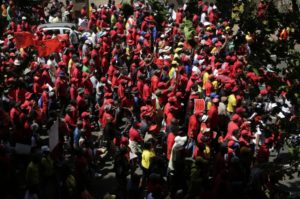
South Africa’s biggest union group held marches nationwide on Wednesday to protest what it alleges is chronic corruption fueled by President Jacob Zuma and a prominent family of business(AP Photo/Themba Hadebe)
JOHANNESBURG (AP) — South Africa’s biggest union group held marches nationwide on Wednesday to protest what it alleges is chronic corruption fueled by President Jacob Zuma and a prominent family of businessmen, reflecting public anger over a scandal that has ensnared several international companies.
The protests by the Congress of South African Trade Unions in Johannesburg and other cities come amid a power struggle within the ruling African National Congress party, the former anti-apartheid movement that has led South Africa since white minority rule ended in 1994. Some former loyalists in the ruling party have called for Zuma’s ouster as a way to restore confidence in the ANC, even though the president’s second five-year term is slated to run until elections in 2019.
The demonstrations by thousands of members of the union group, which once supported Zuma, are unlikely to pose an immediate threat to the president, who retains the support of powerful factions within the ruling party and has survived a series of parliamentary votes of no confidence sponsored by the political opposition. Maneuvering among ANC factions is intensifying ahead of a party conference in December at which Zuma will relinquish the post of party chief.
Some marchers voiced support for Deputy President Cyril Ramaphosa, who is seen as a leading candidate to replace Zuma and whose remarks critical of corruption were interpreted as an attack on the president and his association with the Guptas, a family of Indian immigrant businessmen accused of looting state funds and influencing top government appointments for their own benefit.
While Zuma and the Guptas have denied wrongdoing, mounting scandals have hit international firms with links to the Guptas.
Bell Pottinger, a London-based company, filed for bankruptcy after being thrown out of the trade body of the British public relations industry. An investigation had found that it conducted a racially divisive publicity campaign on behalf of the Guptas’ Oakbay Capital company, highlighting the economic power of South Africa’s white minority in a possible attempt to distract attention from scandals surrounding the family.
KPMG, an international accounting firm, investigated work that it did for the Guptas and said it found “work that fell considerably short of KPMG’s standards,” leading to the dismissals of its chief executive in South Africa and six other senior figures. McKinsey, a U.S. consultancy, has also come under scrutiny, though it said in a statement that it has “not engaged in corruption or paid bribes.”


